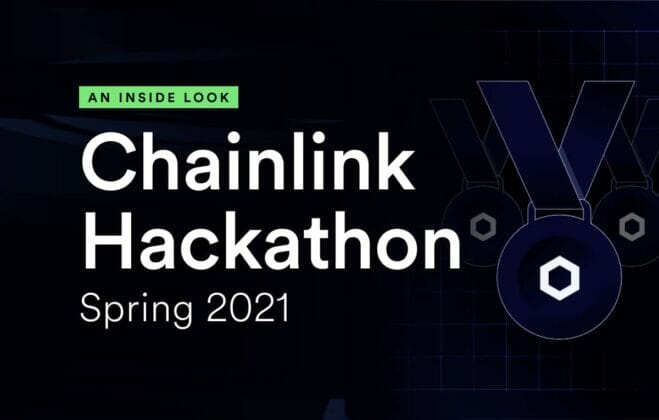The Spring 2021 Chainlink Virtual Hackathon launched March 15th and is well underway with over 3,500 registered participants currently building the next generation of smart contracts. The three-week event is an opportunity for developers throughout the Chainlink ecosystem to connect, collaborate, build and showcase innovations in DeFi, NFTs, gaming and universally connected smart contracts using Chainlink’s blockchain-agnostic oracle network and leading web3 technologies.
The hackathon runs through April 11th and teams must register their projects by March 30th in order to qualify for over $125,000 in prizes. Both experienced developers and those who are completely new to blockchain are encouraged to participate in the event, using a host of tutorials and resources to get started.
The opportunity to build new applications of universally connected smart contracts has never been greater. In addition to a $3,000 NFT & Gaming prize, this year’s hackathon will award a $5,000 Social Impact Prize in partnership with the UNESCO Global Education Coalition’s #LearningNeverStops initiative. The Chainlink grant program-funded prize will be awarded to “the hackathon project that integrates Chainlink with the highest potential to deliver meaningful social impact in education.”
This could include “dynamic NFTs powered by Chainlink VRF that incentivize and gamify education to reduce school dropout rates and support lifelong learning” and “educational certificates for formal university and skills-based courses that are recorded on-chain and in universal passports.”
Mickey Graham, Head of Growth at Chainlink Labs, noted that while NFTs are one of the many new and exciting spaces within crypto, they are still, for the most part, static, meaning that the NFTs do not evolve through interacting with external data or systems outside of blockchain.
“Over time, I believe we’ll see NFTs evolve and transition into more dynamic assets, where external data and events that happen off-chain power upgrades or changes in NFTs,” he said. “A great example of this, and one we’d love to see built during the Spring 2021 Hackathon, would be an NFT-powered learning badge for a skills-based course that is upgraded or powered up as off-chain modules are completed and recorded on-chain.”
As blockchain, smart contracts and oracle technology evolve, there’s exponentially more potential to improve the efficiency, transparency and trust associated with government services, too. The Spring 2021 Chainlink Hackathon’s $5,000 GovTech Prize is sponsored by the Chainlink Community Grant Program in partnership with the Mayor’s Office of Reno, Nevada, and will be awarded to “the hackathon project that uses Chainlink-powered smart contracts in a manner that offers the highest potential to deliver meaningful GovTech innovation.”
Reno Mayor Hillary Schieve will serve as a judge for determining the winner of the GovTech Prize. Mayor Scheive, a notable cryptocurrency and blockchain enthusiast whose progressive initiatives include minting Burning Man NFTs as a way to familiarize Reno’s residents with new, impactful technologies, tweeted “Thrilled to be participating in this year’s #Chainlink Virtual Hackathon. The new GovTech category is a great opportunity for devs who want to build smart contracts to improve government transparency, communication, & efficiency.”
The Chainlink Spring Hackathon is not only an exciting event for developers; it’s the perfect opportunity for anyone, including creatives, artists and writers, to participate and even start to build a career in crypto. It’s not too late to get involved. Learn more about how you can participate here.
Elizabeth Licorish is a writer and author whose work has appeared in HuffPost, PhillyVoice and Bustle. In 2008, she wrote and co-authored Innovation for Underdogs. In 2010, she wrote and edited Charles Manson Now. She received her MFA in creative nonfiction from Rutgers University and has ghostwritten hundreds of executive thought leadership pieces for some of the world’s leading experts across diverse industries. She has been writing and editing for influential blockchain projects since 2017, when she fell in love with decentralized finance’s potential to empower individuals in an economically just world. As the editor-in-chief of Chainlink Today, she’s passionate about telling the human stories behind some of the most promising technology in the fastest-growing blockchain ecosystem.


